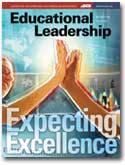As education leaders strive to promote excellence for all students, they confront sharply contrasting schools of thought about the best way to close achievement gaps between students of different racial and socioeconomic backgrounds. One approach emphasizes holding all students to the same high academic standards, delivering research-based instruction and rigorous assessment with accurate feedback, and giving students multiple opportunities to meet standards. Another approach emphasizes the need for teachers and school leaders to acknowledge and confront individual and institutional racism in all its forms, including many of the instructional, curriculum, and assessment practices associated with standards-based education. Education leaders may be pulled in different directions by advocates of these often-conflicting approaches.
Approach 1: A Focus on Individual Effort
For more than 25 years, the Efficacy Institute has supported success in high-poverty, high-minority schools with a bone-deep belief that all students can succeed. The institute emphasizes the use of accurate student achievement data. Although this strategy may not seem controversial, institute founder Jeff Howard contends that a culture of fear undermines the appropriate use of data in schools because teachers feel judged by data, not helped by it (Howard, 2008). The Efficacy Institute approach is built on three elements: building consensus on clear targets for academic proficiency; building belief among teachers, parents, and children themselves that proficiency standards can be achieved; and then building a continuous stream of feedback from student assessments to drive changes in curriculum and instructional strategy.
These strategies, particularly the Efficacy Institute's emphasis on a constructive belief system (“Smart is not something you just are; smart is something you can get!”) are consistent with research on student motivation, such as Stanford psychologist Carol Dweck's (2006) fascinating studies, which suggest that students tend to perform better if they believe their intelligence depends on their own efforts. Howard claims exceptional results in many urban school systems, including, most recently, Memphis, Boston, and Palm Beach County, Florida, where the efficacy approach has resulted in clear and measurable improvement in student outcomes (personal communication, August 15, 2008).
Approach 2: A Focus on Challenging Institutional Inequities
Some advocates assert that racism awareness training is the key to helping teachers reconsider certain fundamental assumptions and practices that magnify educational inequities. Indeed, some groups claim that institutionalized racism overwhelms all other factors.
For example, Glenn Singleton (2006) of the Pacific Educational Group exclaims that “the most devastating factor contributing to the lowered achievement of students of color is institutionalized racism!” He advocates conscious and deliberate action to challenge the impact and perpetuation of such racism.
One way to challenge current power structures is through the intensely individualized assessment suggested by Professor Asao B. Inoue of Southern Illinois University. He writes, “I structure assessment activities that allow students to assess each others' performances, reflect upon how they've made judgments and why, and revise those performances and judgments” (Inoue, n.d.). It's hard to reconcile this reflective approach with standardized assessments, with their expectation that students respond to questions by giving the right answer in the right form the first time. In a personal communication to me, Inoue pointed out that“standards” often is a code word for white, middle-class, male, heterosexual discourse. We should be wary of terms that mask power and social benefits for groups of people, such as “standards.” It's often a racist term used as a neutral one. . . . I'm not saying that everyone should be assessed differently, only that “standards” may be the wrong way to think about the technology of assessment.
From Conflict to Synthesis
The messages of these two approaches can be strikingly contradictory. Should classroom teachers devote their energies to making sure all students acquire academic vocabulary and demonstrate proficiency as measured in standards-based assessments? Or should they reject these goals as reflections of institutionalized white privilege?
This dilemma is unnecessary and counterproductive. Mica Pollock (2006) of the Harvard Graduate School of Education suggests a more nuanced approach to the issues of race in education. She notes,Antiracist educators must constantly negotiate between two antiracist impulses in deciding their everyday behaviors toward students. Moment to moment, they must choose between the antiracist impulse to treat all people as human beings ratherthan “race” group members, and the antiracist impulse to recognize people's real experiencesas race group members in order to assist them and treat them equitably. (p. 2)
Pollock stresses that improving instruction and working against institutional and individual racism must be complementary and not mutually exclusive (personal communication, August 5, 2008). Accepting subpar work from students of color or failing to push these students toward high-quality work is a form of racism, she points out; separating the task of improving instruction from the task of ensuring fair treatment creates a false dichotomy. In her new book, Because of Race: How Americans Debate Harm and Opportunity in Our Schools (Princeton University Press, 2008), Pollock addresses the complex interrelationships between teachers, school leaders, students of color, and their parents.
Long Term and Short Term
Institutional racism is clearly a long-term problem that demands long-term strategies. But as John Maynard Keynes famously said, “In the long term, we're all dead” (Skidelsky, 2000). More than half a century after Brown v. Board of Education, many minority students continue to attend schools with inferior resources, including less qualified teachers (Yun & Moreno, 2006). Therefore, school leaders facing a crisis in equity and achievement need to address the short-term imperatives of improving teaching and leadership. As Pollock's thoughtful work reminds us, antiracism efforts must help teachers become more effective in interacting with students while teaching, not instead of teaching.
